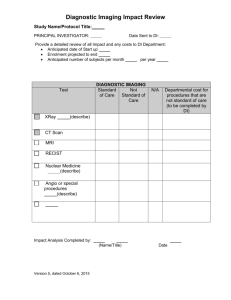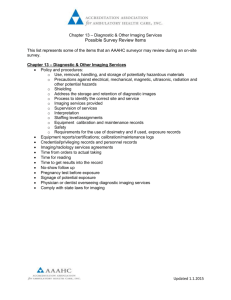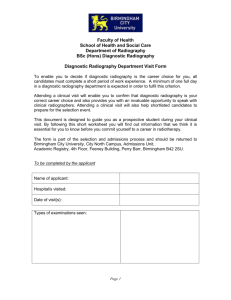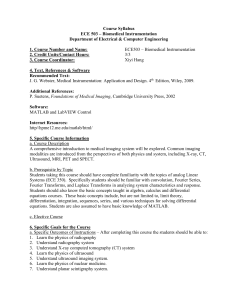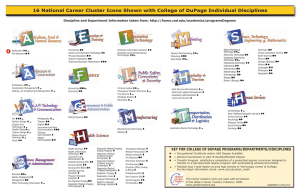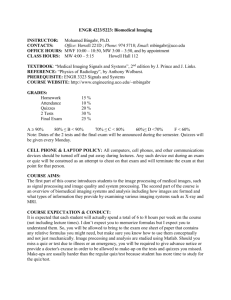Medical Imaging Sciences Frequently Asked Questions.
advertisement
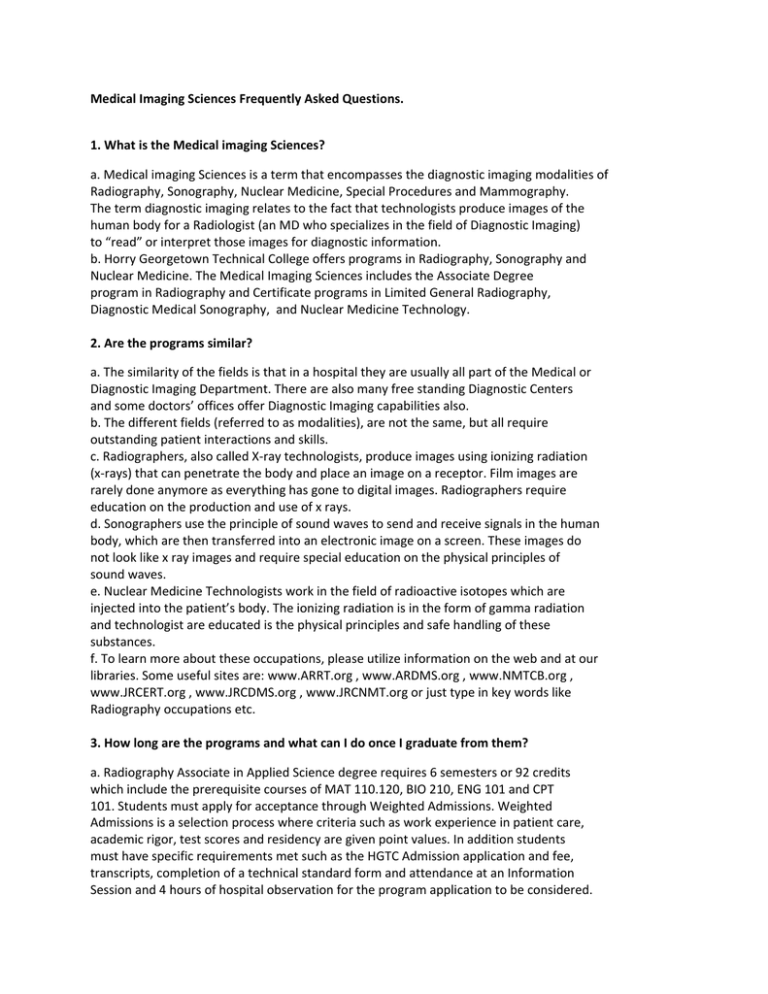
Medical Imaging Sciences Frequently Asked Questions. 1. What is the Medical imaging Sciences? a. Medical imaging Sciences is a term that encompasses the diagnostic imaging modalities of Radiography, Sonography, Nuclear Medicine, Special Procedures and Mammography. The term diagnostic imaging relates to the fact that technologists produce images of the human body for a Radiologist (an MD who specializes in the field of Diagnostic Imaging) to “read” or interpret those images for diagnostic information. b. Horry Georgetown Technical College offers programs in Radiography, Sonography and Nuclear Medicine. The Medical Imaging Sciences includes the Associate Degree program in Radiography and Certificate programs in Limited General Radiography, Diagnostic Medical Sonography, and Nuclear Medicine Technology. 2. Are the programs similar? a. The similarity of the fields is that in a hospital they are usually all part of the Medical or Diagnostic Imaging Department. There are also many free standing Diagnostic Centers and some doctors’ offices offer Diagnostic Imaging capabilities also. b. The different fields (referred to as modalities), are not the same, but all require outstanding patient interactions and skills. c. Radiographers, also called X-ray technologists, produce images using ionizing radiation (x-rays) that can penetrate the body and place an image on a receptor. Film images are rarely done anymore as everything has gone to digital images. Radiographers require education on the production and use of x rays. d. Sonographers use the principle of sound waves to send and receive signals in the human body, which are then transferred into an electronic image on a screen. These images do not look like x ray images and require special education on the physical principles of sound waves. e. Nuclear Medicine Technologists work in the field of radioactive isotopes which are injected into the patient’s body. The ionizing radiation is in the form of gamma radiation and technologist are educated is the physical principles and safe handling of these substances. f. To learn more about these occupations, please utilize information on the web and at our libraries. Some useful sites are: www.ARRT.org , www.ARDMS.org , www.NMTCB.org , www.JRCERT.org , www.JRCDMS.org , www.JRCNMT.org or just type in key words like Radiography occupations etc. 3. How long are the programs and what can I do once I graduate from them? a. Radiography Associate in Applied Science degree requires 6 semesters or 92 credits which include the prerequisite courses of MAT 110.120, BIO 210, ENG 101 and CPT 101. Students must apply for acceptance through Weighted Admissions. Weighted Admissions is a selection process where criteria such as work experience in patient care, academic rigor, test scores and residency are given point values. In addition students must have specific requirements met such as the HGTC Admission application and fee, transcripts, completion of a technical standard form and attendance at an Information Session and 4 hours of hospital observation for the program application to be considered. For a more complete understanding, this information can be accessed online under Medical Imaging Sciences web page at www.hgtc.edu , select Programs of Study. b. Students who complete the program are eligible to sit for a national registry examination and, once certified, can work anywhere in the nation. The majority of technologists work in hospitals but they can also work at clinics, government facilities such as prisons and state hospitals, etc. Some even work as traveling technologists. The state of SC requires Radiologists to be registered and certified in the field. South Carolina accepts the National Certification, so no additional testing is necessary. c. The Limited General Radiography certificate requires 3 semesters. There is no Weighted Admissions process. Students are educated to work in doctor’s offices and clinics where limited x rays are done. The student is not trained in fluoroscopy, OR (operating rooms) and portable radiography and does not have to go to an emergency room to do radiographs. Graduates are eligible to sit for the South Carolina Registry examination (see SCQRSA.org) and this registry is acceptable in some other states. d. The Diagnostic Medical Sonography certificate program requires 4 semesters. The following pre requisites are required: AHS 102/104, BIO 210, BIO 211, CPT 101, ENG 101, MAT 110/120, PSY 201, SPC 205, PHY 118. AHS 110 is also required, if the student has no patient care background. Students enter the program based on a Weighted Admissions process as described above. Graduates of the program, as Sonographers, are eligible to sit for a national registry examination and can work anywhere in the nation. Hospitals and doctor’s offices are the most common areas, although some technologists own and operate their own businesses. e. Nuclear Medicine Technology program certificate requires 3 semesters. The pre requisites are the same as the Sonography program listed above plus CHM 105. This program also is based on a Weighted Admissions process. Nuclear Medicine Graduates also qualify to take a national registry examination allowing them to work in anywhere in the nation. South Carolina also requires this certification for employment. 4. How do I apply? a. The Weighted Admissions application which must be completed, after the HGTC Application for Admission and fee have been submitted, can be accessed under Programs of Study on the HGTC.edu web page. The Weighted Admission Application may be viewed online, but must be submitted to the Admissions Office on any campus. 5. How often are the programs offered? All programs are offered only once a year. Radiography AS degree starts in the summer semester. Nuclear Medicine and Diagnostic Medical Sonography start in the fall semester. The Limited General Radiography starts in the spring semester. The application deadline for Weighted Admissions is marked on the applications at the top of the page. a. For the programs requiring Weighted Admissions, students must apply every year for consideration; therefore students who do not make the acceptance list and still want to be considered the following year must re apply. 6. What are the pre requirements for each program? The weighted Admissions programs have very specific requirements which can be accessed on our web page (Medical Imaging Sciences) under Programs of Study. All students must submit Admission Applications and fees, official copies of HS and College transcripts (when applicable), placement test scores. Criminal Background Checks and Drug Screening are required. Completed Health Forms will be required by the first day of class and must be kept updated. In addition: a. Other requirements: •4 hours of hospital observations done in one 4 hour session at a hospital setting, with documentation on a form. Forms and phone numbers can be found under the Medical Imaging Sciences web page. AS degree in Radiography only. •Completion of a Medical Imaging Sciences Technical Standards Form available on the Medical Imaging Sciences web page or through Admissions. All programs • Completion of an Information Session with the Medical Imaging Sciences Department (Offered in Fall and Spring semester. Look for announcement on Wavenet—if you have applied to HGTC, you should have your WaveNet username and password). • Completion of BIO 210, MAT 110 or120, ENG 101 and CPT 101 with grades of “C” or better. The higher your grade, the more points are assigned for admission purposes. All programs except Limited General Radiography • GPA of 2.5 in all required curriculum courses b. Students applying for the Sonography and Nuclear Medicine programs do not need to do an observation at the hospital site, but do have additional pre requisites: c. The pre requisites in these programs allow the student to apply for an AS degree upon graduation, in General Technology in Applied Sciences with a certificate in Sonography or Nuclear Medicine Technology The pre requisites include: •AHS 102 or 104 •BIO 211 • PSY 201 •SPC 205 • PHY 118 • CHM 105 (NMT only) •AHS 110 if you have no patient care skills 8. What if I am accepted and I decide not to come in the program this year, can I be placed on the list for the following year? No, even students who defer their place must re apply the following year. They will not need to pay another application fee, but make sure their Transcripts are up to date. 9. What if I am an alternate and I don’t get a seat, will I automatically be placed in the following year? No. You will have to re apply by submitting another application to the Admissions office for the program again. An alternate status does not carry over to the following year. 10. Can I transfer from another college where I am currently a student in Radiography or one of the other Medical Imaging Sciences into one of the Medical Imaging Sciences programs at HGTC? This is very difficult to do as we only offer courses in a particular sequence once a year. Generally speaking, we do not allow transfers into the certificate programs as they are of such short endurance and the number of students is controlled by the number we can place at a clinical site. It is also very difficult to transfer into the AS degree Radiography program as it proves difficult to match up the courses semester by semester with the programs students want to transfer from. Any situation or question of transferring is always looked at case by case. Because these programs are so difficult to get into, it is always best to try and finish at the school of your first choice. If a transfer can take place, to be eligible for an academic award at HGTC, the student must complete a minimum of 25% (1/4) of the required courses at HGTC. 11. What do I do if I want to transfer? Talk to someone? If you are trying to transfer to HGTC with core classes you need to have all your transcripts available for the Registrar and Student enrollment to process. If you are trying to finish a Medical imaging Sciences program it is best to contact the Chairperson and/or Program Director to discuss your options. You will need to have available all your course information and credit load you acquired in the program at the other educational institution. Transfer of credits must be acceptable to the HGTC by adhering to accreditation standards. 12. The AS degree in Radiography requires the four pre requisites. Should I take my other core courses also? (What are core courses?) It is always a good idea to work on your core classes. These are the other classes that are not the Radiography classes such as your ENG 101, SPC 205, BIO 211, PSY 201 and a humanities. Even though it is not mandatory it will help on your application under academic rigor where each course grade is given a point value and they can also be applied to the Health Science AS degree. They also can transfer into other majors. 13. How much travel is required for these programs? All programs except Limited General Radiography are taught on the Grand Strand campus. The Limited General Radiography Tech program is on the Georgetown campus. Students in these programs are required to travel to their assigned clinical sites. Because we have sites in Horry, Georgetown, Marion, Florence and Brunswick counties, some extensive travel will be required. Students will be assigned their clinical sites and will attend three or more different sites over the course the program. 14. What if I cannot get into one of the Medical Imaging Science programs that require the weighted Admissions? Are there other options I may consider? There are other options you can consider depending on your areas of interest. If you are interested in the area of patient care and interaction you may want to consider looking into the Limited General Radiologic Technology program, Practical Nursing and AS degree in Nursing, Dental Hygiene or Dental Assisting, Emergency Medical Tech or Paramedic and the Physical Therapy Assistant programs. Other programs which may interest you are Phlebotomy and Massage Therapy. If you are less interested in the “hands on” patient care aspect of the healthcare field, but may enjoy working in a profession that ties into the “health” aspect, then possibly Pharmacy Tech, Medical Office Clerical Assistant or Medical Record Coder may be an interesting and challenging career for you to consider. In this “digital age” there are more and more opportunities opening up for students in these areas. 15. What if I am not sure what I want to do, but think I may be interested in one of the Health Sciences? The best place to start is to pay a visit to the Career Resource Center and see what options may fit your interests. Also it is best to contact and sit down with a Health Science Advisor on one of the three campuses. Another great thing to do is to try and find connections to the professionals that are already in the field and get an idea of what their career’s entail. Make sure to attend “Career” days when they are offered and be willing to look at more than one option, yet try to keep focused as to how the career will fit your capabilities and your desire for a specific field. 16. What happens when I am admitted into one of the Medical Imaging Science Programs? Because there is so much information that has to be received from students prior to entering clinical, students receive contact from one of the program officials via a letter, email or phone call. If a student has not received information at least three weeks prior to the first day of class contact the Chairperson, Program Director or Clinical Coordinator of the respective program. Generally during the first week of classes “Orientation”, Program Policies and Student conduct are covered. There is so much information to go over, it is best to review some of this information from time to time on your own as it is almost impossible to remember everything. Our web page has a lot of information you can access to review prior to the first day of class. If you cannot attend the “Orientation” process during the first week of class, unless otherwise noted , you must immediately contact your assigned faculty or the Program Director. Missing the orientation process is a big deal and can put you behind. One thing current students will relate to you is that the first couple of weeks is overwhelming because there is so much to try to understand and remember for classroom and especially clinical preparation. 17. What happens if I cannot accept my placement into the program? Contact Admissions immediately and also contact the program official in charge of your classes. Because these are limited access programs, only designated students for that program can register for classes. The program will contact an alternate immediately to enter the program. 18. Anything else I should know? Yes: While planning to enroll at HGTC • Research your options. • If you are still in high school, please consider science and math when choosing courses. If your school offers anatomy courses, look into those as well. While enrolled at HGTC • Make sure your courses can help you achieve your immediate goals and future goals by talking with your advisor. • If you anticipate continuing your education, make sure you are taking credits that are also transferrable by talking with your advisor. Make use of the Career Center on the campuses in Conway, Georgetown or Grand Strand and see a Health Science Advisor • When you finish a program of study at HGTC, make sure you apply for your certificate, diploma or degree as these become verifiable documents. (Graduation application is available online)
